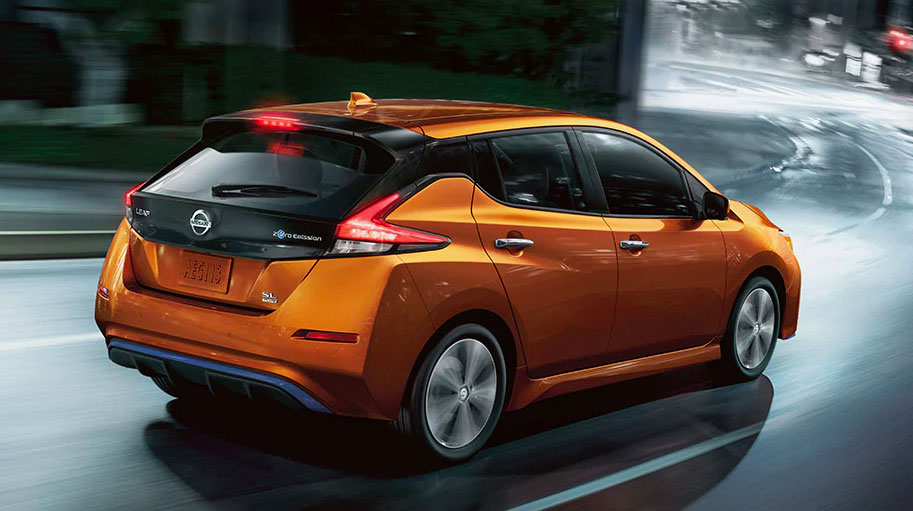Nissan Leaf is being replaced by an all-electric crossover in 2025
The Leaf's replacement is going to ditch the hatchback design to become a crossover SUV

Update: Nissan has just given us our first glimpse at the all-electric Nissan Micra. Considering the current Micra has the exact same design as the Leaf, we have to wonder what this means for the entry-level EV
It’s no secret that the Nissan Leaf’s current visage is getting a bit tired. It has been around since 2017, after all, but it isn’t likely to be around for much longer.
Nissan has confirmed (via AutoCar) that a replacement to the Leaf is coming in 2025, and is set to be built at the company’s U.K. plant in Sunderland. The real news, though? This one is going to be a crossover, rather than a compact hatchback.
- 2022 Nissan Leaf review: How good is the cheapest EV?
- What should you buy? Mini Electric vs Nissan Leaf
- Plus: Volvo C40 Recharge review (hands on)
Nissan Europe boss Guillaume Cartier confirmed the news, as well as the fact this car will be considered the Leaf’s replacement. The fact it’s a crossover also means that Nissan’s European lineup is going to be very heavy on the crossovers going forward. Nissan has already confirmed an all-electric Juke is on the way, joining the Nissan Ariya that's set to launch early next year.
There’s also the X-Trail and Qashqai, which are what’s known as ‘mild hybrids’. These are cars with minor electrification, and power the electric motor with gasoline. However unlike, say, the Toyota Prius, they don’t have enough battery power to drive around on electrical energy alone.
For those unaware, a crossover is best described as something akin to a small SUV. The two car types have a lot in common, including a large amount of interior space. However, a crossover is built on the same platform as a car, meaning they’re generally smaller and lighter. SUVs share a platform with pickup trucks, so are larger and heavier as a result.
Nissan has confirmed that the Leaf replacement will use the Renault-Nissan-Mitsubishi Alliance’s EMF-EV platform. That’s the same platform as the Ariya and Renault’s Megane E-Tech Electric. It’ll also use Envision AESC’s latest batteries.
Sign up to get the BEST of Tom's Guide direct to your inbox.
Get instant access to breaking news, the hottest reviews, great deals and helpful tips.
100,000 units of this new car are set to be produced at the Sunderland plant, and it’s being designed for global markets. Presumably that means it will go on sale in the United States; however, Nissan only confirmed that British-made models will be exported to mainland Europe.
The end of an era for Nissan
The one thing we don’t know is whether this car will bear the Leaf moniker, or where it will sit in Nissan’s electric portfolio. However, according to Autocar, Cartier confirmed that there will be a new smaller EV designed to replace the Nissan Micras. The underpinnings of this car will be left to Mitsubishi and Renault to source.
For those that don’t know, the Micra and second generation Leaf are pretty much identical in design. Presumably that, rather than the new crossover, will take the Leaf’s place as Nissan’s cheap entry-level EV. I do wonder why that car isn’t pinned as the Leaf’s successor, though the fact Nissan is leaving a bunch of the work to its Alliance partners may be the explanation.
In either case, this is the end of an era for Nissan. The Japanese automaker was one of the first companies to really capitalize on the fledgling electric car market. The original Leaf launched in 2012, and while not on the same level as the likes of Tesla, it proved to be an incredibly popular car.
The 2017 redesign took that success and added some necessary improvements, including larger batteries, faster charging, autonomous driving systems, and a design that didn’t look completely awful. However, it was still a compact hatchback.
But this is the next step in Nissan’s plans to electrify its range over the coming decade. The company hopes that its entire portfolio will either be electric, or powered by the same E-power hybrid system as the Qashqai and X-Trail by 2025.
Cartier also confirmed that, unlike other automakers, Nissan is not investing in hydrogen technology. Instead, Nissan will focus all its efforts on electrification, and the goal is to ensure 80% of its sales are of fully-electric vehicles before 2030.
- More: The best electric cars you can buy right now

Tom is the Tom's Guide's UK Phones Editor, tackling the latest smartphone news and vocally expressing his opinions about upcoming features or changes. It's long way from his days as editor of Gizmodo UK, when pretty much everything was on the table. He’s usually found trying to squeeze another giant Lego set onto the shelf, draining very large cups of coffee, or complaining about how terrible his Smart TV is.
